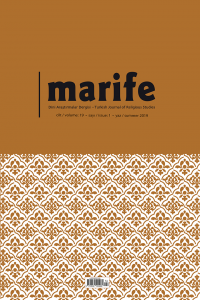
Marife Dini Araştırmalar Dergisi
Yazarlar: İ̇smail KURT
Konular:Din Bilimi
DOI:10.33420/marife.797018
Anahtar Kelimeler:Tafsir,Quran,Caliph,Man,Earth
Özet: In this study, the issue of the caliphate of the man on the earth in the context of the general integrity of the Quran is dealt with over nineteen verses which we determined are directly related to the caliphate by making use of different commentaries. The purpose of the research is to reveal what the intention of Allah by making man the caliph was, whose caliph man is or who man replaces as a caliph, and what message Quran gives to its interlocutors in the relevant verses. While the matter of the caliphate of man is generally tackled over al-Baqarah 30th verse in the previous studies, this research tried to uncover the general perspective of the Quran in the issue by examining all nineteen verses about the caliphate. These verses are firstly sorted in the order of revelation and each verse is examined individually in the context of text and history. Throughout the study, what the verses that the context’ and conditions’ are identified say, scholars’ exegesis on the verse and our interpretation are presented, lastly, the message of the verse is explained. The most general conclusion we have reached in the study is this: Man is the caliph on earth; it is the placing of man on earth instead of his predecessors by God, offering the blessings of the earth to man's disposal so that he can continue his life there, and in return for all these, man is thankful to God and leads a life on earth in accordance with His approval. Indeed, when these verses are examined, we encounter the determination of Allah, the caliphate on earth, and the phenomenon of man. The phenomenon of the caliphate on earth, in the sense of replacing someone or being a proxy for someone raises the question of who is replaced by man or whose proxy man is. When the relevant verses are examined, it will be seen that believers who act in accordance with Allah's will are brought to the earth or their lands instead of the unbelievers who do not act in accordance with Allah's desire. In the beginning of the caliphate to the earth, Adam was brought in instead of jinn or angels. Besides, sometimes unbelievers were temporarily made caliphs on the earth, but these were merely tests to see whether they would turn to Allah. A believer is a caliph, in the sense of being a proxy, he acts in accordance with the approval of Allah, who appointed him as the caliph on earth. In this context, the caliphate may be possible either as in the case of Moses leaving Harun as his proxy when he left for the mountain, or as the prophets acting as proxies of God, due to the ontological necessity, in the context of implementing the revelation of Allah. Other people cannot be Allah’s caliph even if they are sultans, heads of states, or even the caliphs of the Islamic State. Indeed, Abu Bakr, who was called "O Caliph of Allah," said I am not the caliph of Allah, I am only the caliph of the Messenger of Allah. The title of “Caliph of Allah” was never used in the Quran, by the Prophet, and Rashid Caliphs. However, with the era of the Umayyads, this address was used for political purposes. Consequently, as the expression of "Allah’s Caliph" is not mentioned anywhere directly in the Quran, to accept that man is Allah’s caliph or to interpret related verses in this way does not seem correct. Man’s acting befitting the title of caliphate, being worthy of who made him the caliph only possible for him to subject himself to the revelation by using his ration. Because the only condition of Allah for making man the caliph and the continuation of this caliphate is the recognition of the godhead of Allah who made him the caliph. In this context, the verses that mention the caliphate (in terms of their first addressees) have messages given to the Mecca polytheists, the Jews of Medina and the Muslims. These verses send the message to the Makkan polytheists that they should accept the fact that Muhammad was chosen by Allah as a prophet by means of the examples of God making David, and the Jews of Medina, through examples of God making Adam the caliph on earth. Most of the messages given in the verses that mention Caliphate are to the Meccan polytheists, who were the first addressees and opponents of the revelation. They were either encouraged to turn to tawhid because it was a blessing that Allah made them caliphs on earth, or they were threatened by the examples of destroyed tribes because they continued to practice polytheism. They were given the message "O polytheists, it is Allah who created you after the destroyed tribes, not the idols who made caliphs on earth, so you follow the messenger of Allah and turn away from idols and turn to the one God.